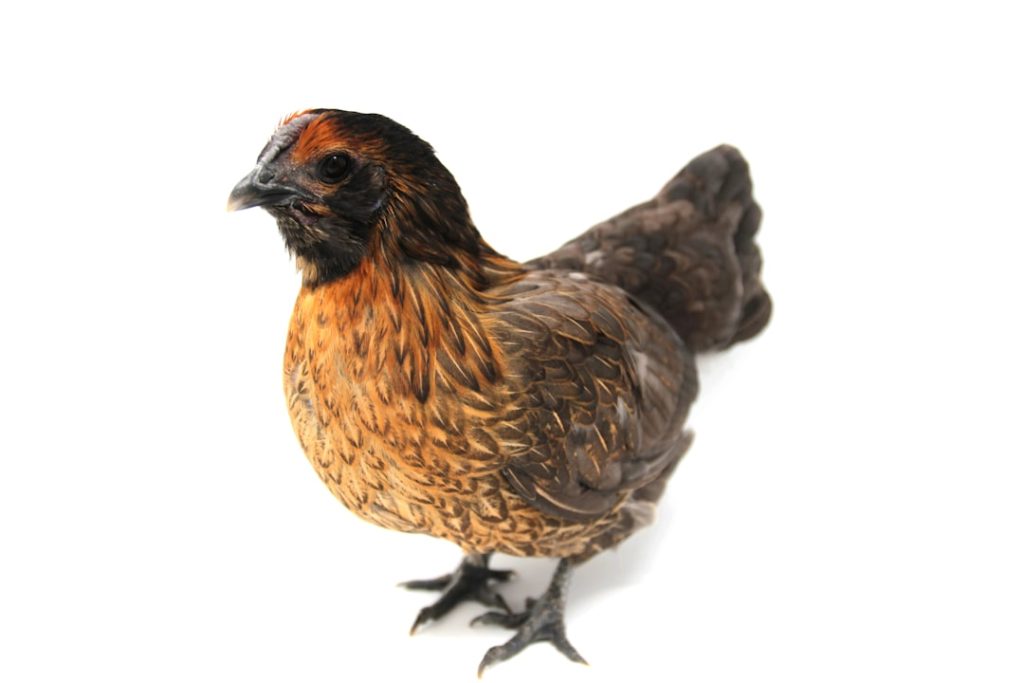Broodiness in chickens is a natural reproductive behavior characterized by a hen’s strong desire to incubate eggs. This instinct is triggered by hormonal changes and is essential for the species’ propagation. During the broody period, which typically lasts around 21 days, the hen dedicates most of her time to sitting on the nest, only briefly leaving to attend to basic needs such as eating, drinking, and defecation.
Broody hens exhibit protective behaviors, including puffing up their feathers and emitting loud clucking sounds to deter potential threats. Throughout the incubation period, the hen maintains optimal egg temperature by sitting on them and regularly turning them to ensure even heat distribution. After hatching, the mother hen continues to care for and protect her chicks, teaching them essential survival skills.
It is important to note that broodiness is not universal among chicken breeds or individual hens. Some breeds are more prone to this behavior, while others may rarely or never exhibit it. For chicken keepers, broodiness can be both advantageous and challenging.
While it provides a natural means of hatching eggs and raising chicks, it can also disrupt egg production and cause stress within the flock. Understanding and effectively managing broody behavior is crucial for maximizing the benefits and minimizing the drawbacks in chicken husbandry. This knowledge allows chicken keepers to make informed decisions about whether to encourage or discourage broodiness based on their specific needs and circumstances.
Table of Contents
- 1 Characteristics of Broody Breeds
- 2 Popular Broody Breeds for Egg Hatching
- 3 Tips for Managing Broody Hens
- 4 Challenges of Broody Hens
- 5 Breeding Broody Chickens
- 6 The Benefits of Broody Breeds
- 7 FAQs
- 7.1 What are broody breeds of chickens?
- 7.2 What are some examples of broody breeds of chickens?
- 7.3 What are the characteristics of broody breeds of chickens?
- 7.4 How can I encourage broodiness in my chickens?
- 7.5 Are broody breeds of chickens good for hatching eggs?
- 7.6 Can I break a broody hen’s broodiness?
Key Takeaways
- Broody behavior in chickens is a natural instinct for hens to sit on eggs and hatch them.
- Characteristics of broody breeds include a strong maternal instinct, dedication to sitting on eggs, and protective behavior.
- Popular broody breeds for egg hatching include Silkie, Orpington, and Cochin chickens.
- Tips for managing broody hens include providing a separate nesting area, collecting eggs frequently, and offering food and water near the nest.
- Challenges of broody hens can include aggression, decreased egg production, and potential health issues.
- Breeding broody chickens can be beneficial for hatching eggs naturally and maintaining a sustainable flock.
- In conclusion, the benefits of broody breeds include natural egg hatching, reduced need for artificial incubation, and the preservation of traditional chicken rearing practices.
Characteristics of Broody Breeds
Characteristics of Broody Breeds
Certain chicken breeds are more predisposed to broodiness than others. These breeds have been selectively bred over generations for their maternal instincts and nurturing behavior. Broody breeds are typically characterized by their dedication to sitting on eggs and raising chicks, as well as their protective nature towards their offspring.
Desirable Traits of Broody Breeds
They tend to be calm, gentle, and attentive mothers, making them ideal for hatching and raising chicks in a natural setting. In addition to their broody behavior, these breeds often have other desirable traits such as good egg production, docile temperament, and attractive plumage. Some popular broody breeds include the Silkie, Orpington, Cochin, and Sussex.
Importance of Broody Breeds in Backyard Chicken Keeping
These breeds are known for their broodiness, making them favorites among backyard chicken keepers and small-scale farmers who want to raise their own chicks without relying on artificial incubation. It’s important to note that while broody breeds are more likely to exhibit broody behavior, individual hens within these breeds may still vary in their propensity for broodiness. Additionally, some non-broody breeds may still have hens that go broody occasionally.
Selecting the Right Breed for Your Needs
Understanding the characteristics of broody breeds can help chicken keepers select the right breeds for their specific needs and preferences.
Popular Broody Breeds for Egg Hatching

1. Silkie: The Silkie is a small breed known for its gentle nature and fluffy plumage. Silkies are renowned for their broodiness and make excellent mothers, often hatching and raising chicks from other breeds as well.
They are also popular for their unique appearance, with black skin, blue earlobes, and feathered feet. 2. Orpington: Orpingtons are large, docile birds with a friendly disposition.
They are known for their broodiness and make excellent mothers, diligently caring for their eggs and chicks. Orpingtons come in a variety of colors including buff, black, blue, and white, making them an attractive addition to any flock. 3.
Cochin: Cochins are a heavy breed with a calm and friendly temperament. They are highly broody and make devoted mothers, often raising multiple clutches of chicks throughout the year. Cochins are also prized for their beautiful plumage and distinctive feathered legs.
4. Sussex: Sussex chickens are known for their dual-purpose nature, excelling in both egg production and broodiness. They are friendly, adaptable birds that make excellent mothers, diligently tending to their eggs and chicks.
Sussex chickens come in a variety of colors including speckled, red, and white. These popular broody breeds are favored by chicken keepers for their maternal instincts, making them ideal for hatching eggs and raising chicks in a natural setting. Their gentle nature, dedication to motherhood, and attractive appearance make them valuable additions to any flock.
Tips for Managing Broody Hens
Managing broody hens requires careful attention to ensure their well-being and productivity within the flock. Here are some tips for effectively managing broody hens: 1. Provide a separate nesting area: Broody hens should be given a private nesting area where they can sit on their eggs undisturbed.
This will help reduce stress and ensure that the hen can focus on incubating her eggs without interference from other flock members. 2. Collect eggs frequently: To discourage broodiness in non-broody hens and prevent the accumulation of too many eggs in the nest, it’s important to collect eggs regularly.
This will also help prevent the development of rotten eggs and reduce the risk of disease within the flock. 3. Offer food and water near the nest: Broody hens may be reluctant to leave the nest to eat and drink, so it’s important to provide easy access to food and water near the nesting area.
This will ensure that the hen stays well-nourished and hydrated during her broody period. 4. Provide regular breaks: It’s important to gently encourage broody hens to take short breaks from the nest each day to stretch their legs, eat, drink, and relieve themselves.
This will help prevent muscle atrophy and maintain the hen’s overall health. 5. Use a broody coop: If a broody hen is disrupting egg production or causing stress within the flock, she can be moved to a separate broody coop where she can continue her brooding behavior without affecting the rest of the flock.
By following these tips, chicken keepers can effectively manage broody hens and ensure their well-being while maximizing the benefits of their broodiness.
Challenges of Broody Hens
While broody hens can be valuable for hatching eggs and raising chicks, they also present certain challenges for chicken keepers. Some of the challenges of managing broody hens include: 1. Disrupted egg production: Broody hens will stop laying eggs while they are brooding, which can reduce overall egg production within the flock.
This can be problematic for chicken keepers who rely on a consistent supply of eggs. 2. Aggressive behavior: Broody hens can become fiercely protective of their nest and may exhibit aggressive behavior towards other flock members who come too close.
This can lead to conflicts within the flock and potential injuries to other chickens. 3. Extended broodiness: Some hens may remain broody for longer than the typical 21-day incubation period, leading to prolonged disruptions in egg production and potential health issues for the hen.
4. Health risks: Broody hens may neglect their own health during the brooding process, leading to weight loss, dehydration, and muscle atrophy if they do not take regular breaks from the nest. 5.
Flock dynamics: Broody hens can disrupt the social dynamics within the flock, causing stress and tension among other chickens. Despite these challenges, with proper management and understanding of broody behavior, chicken keepers can successfully navigate the complexities of broodiness and harness its benefits for natural egg hatching and chick rearing.
Breeding Broody Chickens

Key Traits to Consider
When breeding broody chickens, it’s important to consider not only their broodiness but also other desirable traits such as good egg production, docile temperament, and overall health.
Creating an Ideal Environment
By carefully selecting breeding stock based on these criteria, chicken keepers can develop lines of chickens that excel in both productivity and maternal care. Additionally, providing a suitable environment for broody hens to express their natural behaviors is essential for successful breeding. This includes providing private nesting areas, regular access to food and water near the nest, and opportunities for regular breaks from brooding.
Successful Breeding and Productivity
By breeding broody chickens with care and consideration for their natural instincts, chicken keepers can develop lines of chickens that are well-suited for natural egg hatching and chick rearing while maintaining overall productivity within the flock.
The Benefits of Broody Breeds
In conclusion, understanding broody behavior in chickens is essential for effectively managing broody hens and harnessing the benefits they bring to a chicken operation. Broody breeds are characterized by their strong maternal instincts, nurturing behavior, and dedication to sitting on eggs and raising chicks. Popular broody breeds such as Silkies, Orpingtons, Cochins, and Sussex are favored by chicken keepers for their valuable traits and contributions to natural egg hatching and chick rearing.
While managing broody hens presents certain challenges such as disrupted egg production and aggressive behavior, with proper care and attention, these challenges can be mitigated. By providing suitable nesting areas, collecting eggs regularly, offering food and water near the nest, providing regular breaks from brooding, and using separate broody coops when necessary, chicken keepers can effectively manage broody hens while maximizing the benefits of their broodiness. Breeding broody chickens involves selecting individuals with strong maternal instincts and nurturing behavior to develop lines of chickens that excel in both productivity and maternal care.
By breeding broody chickens with care and consideration for their natural instincts, chicken keepers can develop lines of chickens that are well-suited for natural egg hatching and chick rearing while maintaining overall productivity within the flock. In conclusion, broody breeds play an important role in natural egg hatching and chick rearing within a chicken operation. By understanding their behavior, effectively managing them, and selectively breeding them for desirable traits, chicken keepers can harness the benefits of broodiness while maintaining a healthy and productive flock.
If you’re considering raising broody breeds of chickens, you may want to read this article on chicken coop interior ideas to ensure that your coop is set up to accommodate their nesting and brooding behaviors. Creating a comfortable and suitable environment for broody hens is essential for their well-being and productivity.
FAQs
What are broody breeds of chickens?
Broody breeds of chickens are those that have a strong tendency to go broody, which means they have a strong desire to sit on and hatch a clutch of eggs.
What are some examples of broody breeds of chickens?
Some examples of broody breeds of chickens include Silkie, Orpington, Cochin, and Sussex.
What are the characteristics of broody breeds of chickens?
Broody breeds of chickens are known for their strong maternal instincts, often becoming protective and aggressive when sitting on a clutch of eggs. They may also stop laying eggs during this time.
How can I encourage broodiness in my chickens?
You can encourage broodiness in your chickens by providing a quiet, secluded nesting area with comfortable bedding and by leaving a clutch of eggs in the nest for them to sit on.
Are broody breeds of chickens good for hatching eggs?
Yes, broody breeds of chickens are excellent for hatching eggs as they are dedicated and attentive mothers, ensuring the eggs are kept warm and safe until they hatch.
Can I break a broody hen’s broodiness?
Yes, you can break a broody hen’s broodiness by removing her from the nest and keeping her in a separate, well-ventilated area for a few days. This will often break the broody behavior.
Meet Walter, the feathered-friend fanatic of Florida! Nestled in the sunshine state, Walter struts through life with his feathered companions, clucking his way to happiness. With a coop that’s fancier than a five-star hotel, he’s the Don Juan of the chicken world. When he’s not teaching his hens to do the cha-cha, you’ll find him in a heated debate with his prized rooster, Sir Clucks-a-Lot. Walter’s poultry passion is no yolk; he’s the sunny-side-up guy you never knew you needed in your flock of friends!







